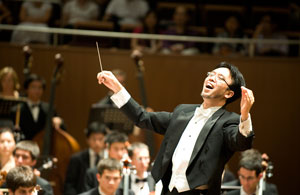Classical Archives is privileged to present this interview with Maestro Jindong Cai, international conductor, and Director of the US-China Music Institute at Bard College.
Together with his wife Sheila Melvin, Maestro Cai has coauthored many articles on the performing arts in China and the 2004 book Rhapsody in Red: How Western Classical Music Became Chinese. Their latest book, Beethoven in China: How the Great Composer Became an Icon in the People’s Republic, was published in 2015 by Penguin. We highly recommend it to members of Classical Archives.Over his 30-year career in the United States, Maestro Cai has established himself as an active and dynamic conductor, a scholar of Western classical music in China, and a leading advocate of music from across Asia.
Born in Beijing, he received his early musical training in China, where he learned to play violin and piano. He then came to the United States for graduate studies at the New England Conservatory and the College-Conservatory of Music in Cincinnati. In 1989, he was selected to study with Leonard Bernstein at the Tanglewood Music Center. He won the Conducting Fellowship Award at the Aspen Music Festival in 1990 and 1992.
Maestro Cai started his professional conducting career with the Cincinnati Symphony Orchestra and has worked with numerous orchestras throughout North America and Asia. He maintains strong ties to his homeland and has conducted most of the top orchestras in China. He has served as the principal guest conductor of the China Shenzhen Symphony Orchestra since 2012. He is a three-time recipient of the ASCAP Award for Adventurous Programming of Contemporary Music. He is principal guest conductor of the Mongolia State Academic Theatre of Opera and Ballet in Ulaanbaatar.
Maestro Cai founded the US-China Music Institute at the Bard Conservatory in 2017 and created the Institute’s annual China Now Music Festival in the following year. In its first two seasons, China Now presented new works by some of the most important Chinese composers of our time, with concerts performed at Lincoln Center, Carnegie Hall, Bard’s Fisher Center, and Stanford University.
Again, let us say how honored we are to present this interview with Maestro Cai.
His insights changed our understanding of the resonances between so-called Eastern and Western music – and we are certain you will gain new insights too.

![Beethoven in China: How the Great Composer Became an Icon in the People's Republic: Penguin Specials by [Jindong Cai, Sheila Melvin]](https://m.media-amazon.com/images/I/51r9kgHlfCL.jpg)
Recent Comments